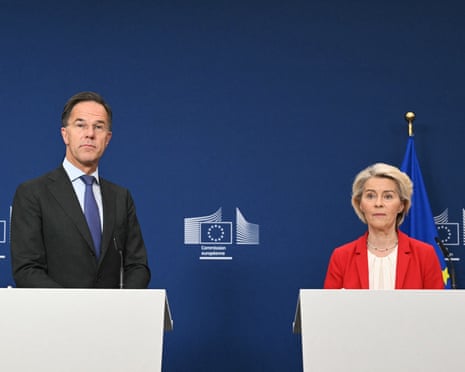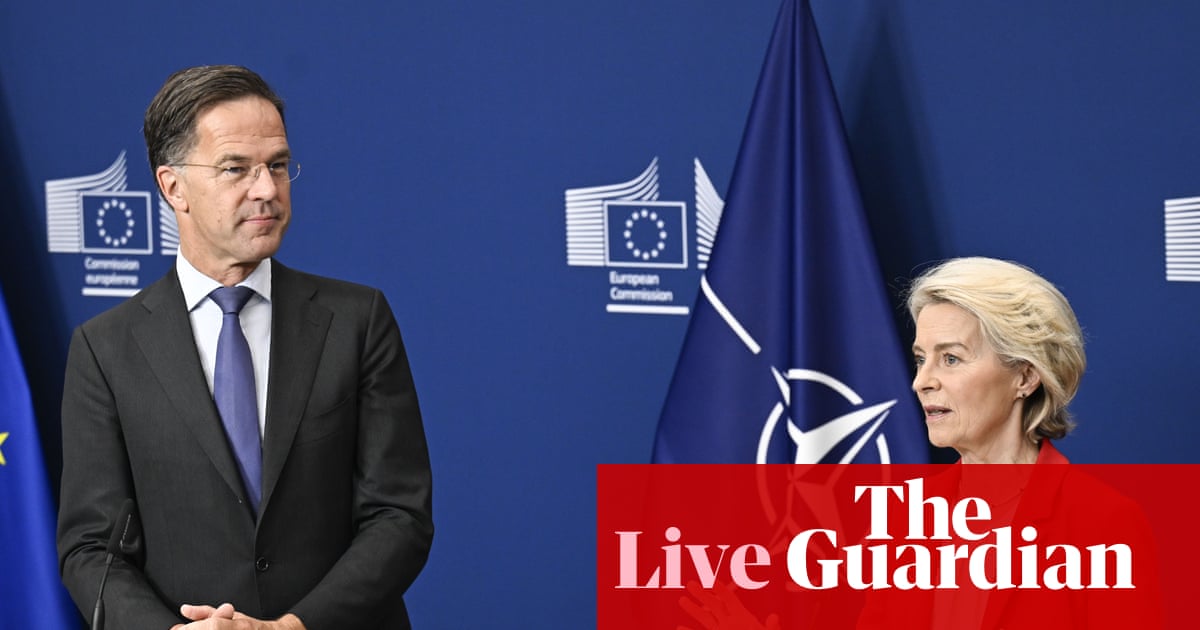Europe must give strong and united response to Russian drone incursions, says von der Leyen – Europe live | Europe
Morning opening: All eyes on European security Jakub Krupa EU commissioners are meeting today for a “security college” discussion on defence and security issues, where they will be joined by the secretary general of Nato, Mark Rutte. Their meeting comes amid growing concerns about drones appearing in European airspace, causing continuing disruption in parts of…
Morning opening: All eyes on European security

Jakub Krupa
EU commissioners are meeting today for a “security college” discussion on defence and security issues, where they will be joined by the secretary general of Nato, Mark Rutte.
Their meeting comes amid growing concerns about drones appearing in European airspace, causing continuing disruption in parts of the Nordics. It remains unconfirmed who or what is behind them, but still prompted a strong reaction in the region. Denmark, which will host two major European summits this week, moved to immediately strengthen its air defences to safeguard the meetings.
Earlier this month, a number of central and eastern European countries also reported Russian violations of their airspace, most notably when over 20 drones crossed into Poland, and three MiG fighter jets violated Estonian airspace.

Speaking in Brussels in the last few minutes, the European Commission president, Ursula von der Leyen, said “Europe must deliver a strong and united response to Russia’s drone incursions at our borders,” stressing the need to press ahead with building a “drone wall” to increase security.
Nato’s Rutte agreed with the urgency, stressing that while the alliance is still assessing who – or what – is behind the drone incursions in Denmark, “when it comes to Poland and Estonia, it is clear that it is the Russians.”
“Still, we are assessing whether it is intentional or not. But even if it is not intentional, it is reckless and it is unacceptable.”
Von der Leyen also spoke about Ukraine, hailing its resilience and stressing it has ceded “virtually no territory this year”, despite continuing conflict. She said the EU’s sanctions “are working” and the bloc will want to push further with the upcoming, 19th package of measures against Moscow.
The EU has agreed with Ukraine that “a total of €2bn will be spent on drones,” which “allows Ukraine to scale up and to use its full capacity.” Crucially, von der Leyen indicated the EU will want to push ahead with what it calls “reparation loans,” based on the frozen Russian assets – a part of which will be used to fund EU defence industry, too.
She offered a bit more detail on how the scheme is supposed to work, saying:
“The loan would not be disbursed in one go, but in tranches and with conditions attached. And we will strengthen our own defence industry by ensuring that part of the loan is used for procurement in Europe and with Europe.
Importantly, there is no seizing of the assets. Ukraine has to repay the loan, if Russia is paying reparations. The perpetrator must be held responsible.”
We are expecting more security discussions to come today, including those happening during the second day of the Warsaw Security Forum, where we are going to hear from ministers and US special envoy Keith Kellogg, among others.
I will bring you all the latest here.
It’s Tuesday, 30 September 2025, it’s Jakub Krupa here, and this is Europe Live.
Good morning.
Key events
Former aide to German AfD lawmaker jailed for spying for China
In other news, a former aide to German far-right lawmaker Maximilian Krah in the European parliament was jailed for four years and nine months on Tuesday on charges of spying for China, AFP reported.
The court in Dresden found that Jian Guo was guilty of acting as an agent for a Chinese intelligence service while working for Krah, a member of the far-right Alternative for Germany (AfD).
US focus is to ‘stop the largest land war in Europe since second world war,’ Kellogg says
Closing the panel, US envoy Kellogg spelled out the US position on Ukraine, as he said:
“The biggest thing we want to do is stop the largest land war in Europe since the second world war.
And this is a war of industrial strength with over hundreds – not one thousand or two thousand, we’re talking hundreds, plural, of thousands – of killed in action there.
In Afghanistan, Russians came out after losing 18,000; we left Vietnam after losing 65,000. We’re now talking of the level of dead and wounded on both sides [that] have eclipsed a million.
Stunning. And so I think this war needs to come to an end to some way.”
US deal with Belarus was primarily on ‘ensuring lines of communication’ to Putin, not freeing prisoners, Kellogg says
US envoy Kellogg also offered a bit of tasty colour on the US relationship with Belarus, after a deal earlier this month to release some political prisoners in exchange for loosening some of sanctions on Minsk.
He stressed that the US focus on Lukashenko was because “we know he talks to President Putin a lot.” “We’re not sure what he says, but we know that he talks to him,” he says.
“But what we did, we established a relationship to ensure the lines of communication were open so we could make sure all of our messaging was being passed to President Putin. That was the reason we did it; we weren’t going in there initially to get political prisoners out,” he said.
Kellogg stressed that the success in releasing some political prisoners was a positive side to that, but “the overall objective of that was not to free political prisoners – the overall objective was [to] find a resolution to the best way we can to the war between Ukraine and Russia.”
He said the US focus was on making sure “the messages were being sent to Vladimir Putin are consistent with the messages that have gone to other circles”.
“I don’t care if it’s Kirill Dmitriev, I don’t care if it’s [Yuri] Ushakov; I don’t care if it’s Lukashenko. The fact is making sure those messages come across,” he said.
He also said that US is not “naive” about Lukashenko’s rule, and “we know if he releases one [prisoner], he probably picks up two more”.
Kellogg also added that the deal with Belarus was to help the state-owned airline Belavia fix their aircraft as “the preferred option is that their aeroplanes don’t fall out of the skies,” but to make it clear they must not use them for “nefarious purposes” and flying migrants into Europe. “That’s the bottom line,” he said.
‘No decision’ made on reviewing US training posture in Baltics, CEE, Latvian foreign minister says
Speaking at the same event, the Latvian foreign minister, Baiba Braže, was also asked about reported US plans to review its support for training and US military presence in central and eastern Europe.
But she insisted that “for now, no decisions have been made on cutting something or eliminating something; quite the opposite”.
“We have heard some good things from Washington and that’s the way we intend to continue,” she said, stressing the region’s support for President Trump “in his quest for peace in Ukraine.”
Asked to be more specific about signals she heard from Washington, she said:
“They will be public when they become public.”
The senior Polish presidential aide Marcin Przydacz agreed with her, saying Poland “does not have any negative signals” from the US.
“We’ve heard public statements [from] President Trump that American troops will stay in Poland, and with a bit of strategic messaging towards Moscow, I think, President Trump also said there is a chance for further deployment of American troops.
We don’t know whether it will happen or not. It is also a job for us, for Polish diplomacy, to work on that.”
The US envoy for Ukraine, Keith Kellogg, has distanced himself from his earlier comments on the US plans to respond to Ukrainian president Volodymyr Zelenskyy’s request for US Tomahawk long-range cruise missiles to conduct strikes inside Russia.
Speaking at the Warsaw Security Forum, Kellogg stressed he was merely talking about public statements, and had no inside knowledge of the process or the final decision.
But he stressed the significance of Tomahawks, saying it’s a “very advanced missile system” and if it was authorised to be used, it would “change the dynamics of any military conflict” as it adds another layer of “uncertainty” because of its capabilities.
Morning opening: All eyes on European security

Jakub Krupa
EU commissioners are meeting today for a “security college” discussion on defence and security issues, where they will be joined by the secretary general of Nato, Mark Rutte.
Their meeting comes amid growing concerns about drones appearing in European airspace, causing continuing disruption in parts of the Nordics. It remains unconfirmed who or what is behind them, but still prompted a strong reaction in the region. Denmark, which will host two major European summits this week, moved to immediately strengthen its air defences to safeguard the meetings.
Earlier this month, a number of central and eastern European countries also reported Russian violations of their airspace, most notably when over 20 drones crossed into Poland, and three MiG fighter jets violated Estonian airspace.
Speaking in Brussels in the last few minutes, the European Commission president, Ursula von der Leyen, said “Europe must deliver a strong and united response to Russia’s drone incursions at our borders,” stressing the need to press ahead with building a “drone wall” to increase security.
Nato’s Rutte agreed with the urgency, stressing that while the alliance is still assessing who – or what – is behind the drone incursions in Denmark, “when it comes to Poland and Estonia, it is clear that it is the Russians.”
“Still, we are assessing whether it is intentional or not. But even if it is not intentional, it is reckless and it is unacceptable.”
Von der Leyen also spoke about Ukraine, hailing its resilience and stressing it has ceded “virtually no territory this year”, despite continuing conflict. She said the EU’s sanctions “are working” and the bloc will want to push further with the upcoming, 19th package of measures against Moscow.
The EU has agreed with Ukraine that “a total of €2bn will be spent on drones,” which “allows Ukraine to scale up and to use its full capacity.” Crucially, von der Leyen indicated the EU will want to push ahead with what it calls “reparation loans,” based on the frozen Russian assets – a part of which will be used to fund EU defence industry, too.
She offered a bit more detail on how the scheme is supposed to work, saying:
“The loan would not be disbursed in one go, but in tranches and with conditions attached. And we will strengthen our own defence industry by ensuring that part of the loan is used for procurement in Europe and with Europe.
Importantly, there is no seizing of the assets. Ukraine has to repay the loan, if Russia is paying reparations. The perpetrator must be held responsible.”
We are expecting more security discussions to come today, including those happening during the second day of the Warsaw Security Forum, where we are going to hear from ministers and US special envoy Keith Kellogg, among others.
I will bring you all the latest here.
It’s Tuesday, 30 September 2025, it’s Jakub Krupa here, and this is Europe Live.
Good morning.

